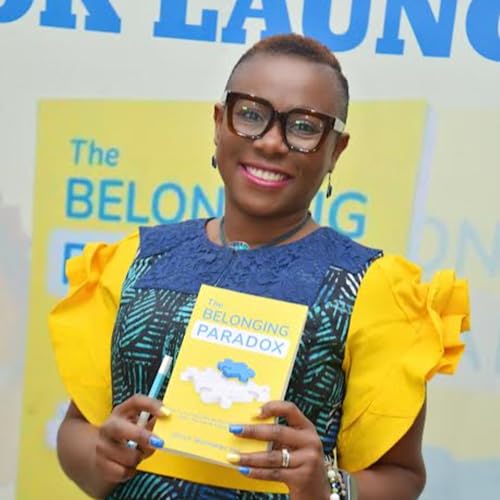Dr. Otito Iwuchukwua is a brilliant organizational psychologist, an author, scientist, and educator. She is a member of the Department of Pharmaceutical Sciences at the College of Pharmacy and Health Sciences. She is a Pharmacist Scientist with a Ph.D. in Pharmaceutical Sciences, specialization in Drug Metabolism and Pharmacokinetics, from Temple University School of Pharmacy in Philadelphia.
Dr. Iwuchukwu, PhD, is on a mission to write books that help people connect with themselves, each other, and the world around them through stories. Her latest book, The Belonging Paradox, is a personal navigator’s guide to understanding oneself in relationship to others in various life spaces. Through individual belonging stories, research insights, and incisive reflection questions, the book encourages readers to perceive belonging and then beam it out into the world. When we belong to ourselves, no matter who we are or where we are, we can let go of the stories we tell ourselves as we reframe challenging interpersonal relationships. Otito believes that belonging is both personal and collective and is not an individual mission to be conquered. We need a community to reflect belonging fully. The Belonging Paradox helps readers see, in no uncertain terms, that if we truly learn to belong to ourselves, we can offer genuine belonging to others in our lives.
Summary
In this conversation, we explored the complex experiences of African immigrants in America, focusing on themes of migration, identity, and belonging. Dr. Otito Iwuchukwua shares her personal journey, discussing the challenges of cultural shock, navigating professional spaces, and the importance of mentorship. The discussion also highlights the significance of pharmacogenomics and the role of storytelling in fostering community and understanding. Ultimately, the conversation emphasizes the need for connection, cultural exchange, and the power of belonging in shaping the immigrant experience.
Takeaways
Dr. Otito Iwuchukwua the importance of belonging and identity.
Cultural shock is a common experience for immigrants adjusting to life in the U.S.
Navigating professional spaces can be challenging for immigrants, especially in predominantly white environments.
Pharmacogenomics is a field that studies how genetics affect drug responses.
Mentorship plays a crucial role in the success of immigrants in their professional journeys.
Racial dynamics in America can create barriers to belonging for immigrants and people of color.
The Belonging Paradox explores the complexities of feeling like an outsider.
Parents can help their children feel a sense of belonging by connecting them to their cultural roots.
Cultural exchange and storytelling can bridge gaps between different communities.
Chapters:
01:20 Exploring Migration and Identity
03:09 Dr. 'Otito Iwuchukwua Background and Family History
05:10 Motivations for Migrating to the U.S.
07:14 Emotional Aspects of Leaving Home
09:08 Cultural Shock and Adjustment in the U.S.
13:14 Finding Community and Belonging
16:04 Professional Journey in Pharmacogenomics
19:44 Understanding Genomics and Precision Medicine
22:00 Navigating Challenges as a Woman of Color in Science
27:31 Mentorship and Role Models in Academia
29:53 Navigating Professional Identity as an Immigrant
36:00 Understanding Racial Dynamics in the U.S.
44:23 The Concept of Belonging
55:59 Experiencing Liminal Spaces as Immigrants
01:00:10 Defining True Belonging
01:02:31 Nurturing a Sense of Belonging in Children
01:04:21 Cultural Connection and Identity
01:09:00 The Role of Home in Belonging
01:12:23 Navigating Intraracial Discrimination
01:15:04 Understanding Scarcity and Resource Dynamics
01:18:11 Empathy and Shared Experiences
01:22:15 Building Bridges Across Cultures
01:26:27 The Power of Storytelling and Community
To furtherconnect with Dr. Iwuchukwua please visit her website @ http://www.otitoiwuchukwu.com/
 1 h et 30 min
1 h et 30 min
 47 min
47 min 1 h et 8 min
1 h et 8 min 58 min
58 min 1 h et 59 min
1 h et 59 min 1 h et 23 min
1 h et 23 min 1 h et 4 min
1 h et 4 min

